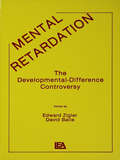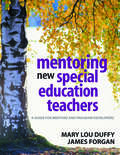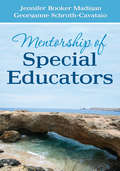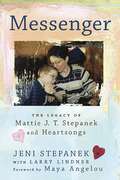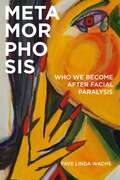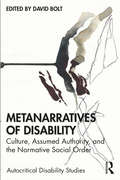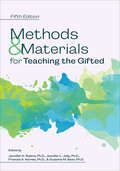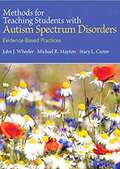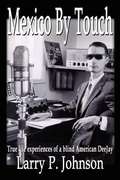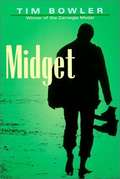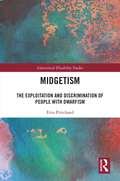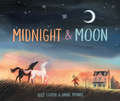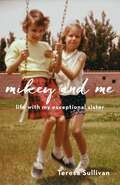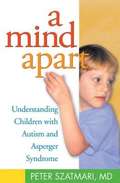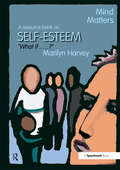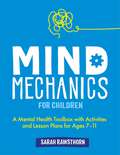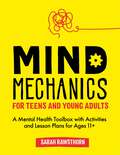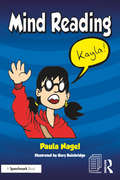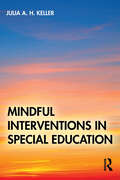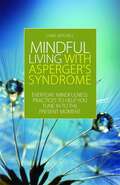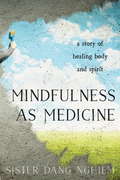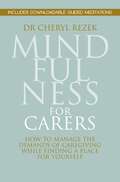- Table View
- List View
Mental Retardation: The Developmental-difference Controversy
by Edward Zigler David BallaPublished in 1983, Mental Retardation is a valuable contribution to the field of Education.
Mentoring New Special Education Teachers: A Guide for Mentors and Program Developers (1-off Ser.)
by Mary Lou Duffy Dr James W. ForganHow do you avoid the high cost of turnover and retain high-quality special education teachers in such a demanding field? Special education teachers are leaving the field at twice the rate of general education teachers. Why? Mentoring New Special Education Teachers will help administrators and other educators develop and sustain effective mentoring programs specifically designed for special education teachers, providing practical, field-tested activities and resources for both the mentors and the mentees, including such critical elements as: Effectively identifying, recruiting, and selecting mentors Action planning Evaluating progress Addressing diminishing support Dealing with burnout and isolation Vignettes of real-life mentoring experiences Figures, tables, appendices, and Web sites A ready-to-use two-day workshop for training mentors
Mentoring New Special Education Teachers: A Guide for Mentors and Program Developers (1-off Ser.)
by Mary Lou Duffy Dr James W. ForganHow do you avoid the high cost of turnover and retain high-quality special education teachers in such a demanding field? Special education teachers are leaving the field at twice the rate of general education teachers. Why? Mentoring New Special Education Teachers will help administrators and other educators develop and sustain effective mentoring programs specifically designed for special education teachers, providing practical, field-tested activities and resources for both the mentors and the mentees, including such critical elements as: Effectively identifying, recruiting, and selecting mentors Action planning Evaluating progress Addressing diminishing support Dealing with burnout and isolation Vignettes of real-life mentoring experiences Figures, tables, appendices, and Web sites A ready-to-use two-day workshop for training mentors
Mentorship of Special Educators
by Jennifer C. Madigan Georganne S. Schroth-CavataioThe definitive guide for mentoring special education teachers <p><p> The national shortage and high attrition rate of special education teachers are impediments to serving students with special needs. This book helps meet an essential need for attracting, retaining, and supporting special educators. The authors provide a wealth of research-based tools for professional developers to use in multiple settings, including schools with culturally and linguistically diverse students.
Messenger: The Legacy of Mattie J. T. Stepanek and Heartsongs
by Jeni Stepanek Larry LindnerIn Messenger, Jeni Stepanek shares the inspiring story of her son's life. Mattie was born with a rare disorder called Dysautonomic Mitochondrial Myopathy, and Jeni was advised to institutionalize him. Instead, she nurtured a child who transformed his hardships into a worldwide message of peace and hope.
Metamorphosis: Who We Become after Facial Paralysis
by Faye Linda WachsLosing her smile to synkinesis after unresolved Bell’s palsy changed how Faye Linda Wachs was seen by others and her internal experience of self. In Metamorphosis, interviewing over one hundred people with acquired facial difference challenged her presumptions about identity, disability, and lived experience. Participants described microaggressions, internalizations, and minimalizations and their impact on identity. Heartbreakingly, synkinesis disrupts the ability to have shared moments. When one experiences spontaneous emotion, wrong nerves trigger misfeel and misperception by others. One is misread by others and receives confusing internal information. Communication of and to the self is irrevocably damaged. Wachs describes the experience as a social disability. People found a host of creative ways to reinvigorate their sense of self and self-expression. Like so many she interviewed, Wachs experiences a process of change and growth as she is challenged to think more deeply about ableism, identity, and who she wants to be.
Metanarratives of Disability: Culture, Assumed Authority, and the Normative Social Order (Autocritical Disability Studies)
by David BoltThis book explores multiple metanarratives of disability to introduce and investigate the critical concept of assumed authority and the normative social order from which it derives. The book comprises 15 chapters developed across three parts and, informed by disability studies, is authored by those with research interests in the condition on which they focus as well as direct or intimate experiential knowledge. When out and about, many disabled people know only too well what it is to be erroneously told the error of our/their ways by non-disabled passers-by, assumed authority often cloaked in helpfulness. Showing that assumed authority is underpinned by a displacement of personal narratives in favour of overarching metanarratives of disability that find currency in a diverse multiplicity of cultural representations – ranging from literature to film, television, advertising, social media, comics, art, and music – this work discusses how this relates to a range of disabilities and chronic conditions, including blindness, autism, Down syndrome, diabetes, cancer, and HIV and AIDS. Metanarratives of Disability will be of interest to all scholars and students of disability studies, medical sociology, medical humanities, education studies, cultural studies, and health.
Methods and Materials for Teaching the Gifted (Other Ser.)
by Jennifer Jolly Jennifer RobinsThe completely revised and updated fifth edition of Methods and Materials for Teaching the Gifted:Provides a comprehensive examination of the most current research and best practices in the field of gifted education.Addresses identification, twice-exceptionality, and culturally and linguistically diverse learners.Includes chapters related to designing curriculum and differentiating instruction.Covers developing critical and creative thinking, as well as encouraging talent development.Features chapter authors who are recognized researchers, practitioners, and leaders in the field of gifted education.The chapters are organized to promote critical thinking and discussion about each topic. This text is a complete resource curated for a wide range of K-12 educators and those working with inservice and preservice educators and administrators.
Methods for Teaching Students With Autism Spectrum Disorders: Evidence-Based Practices
by Stacy L. Carter John J. Wheeler Michael R. MaytonMethods for Teaching Students with Autism Spectrum Disorders is the most comprehensive text available, aimed at helping pre-service and in-service teachers and related service professionals understand the importance of evidence-based practices in the education of learners with Autism Spectrum Disorders (ASD) from a family and longitudinal learning perspective. <p><p>With its emphasis on the theme of family and professional partnerships and collaboration and consultation, the book includes learning aids such as suggested print and web-based resources, graphic organizers, and points for reflection; child and family vignettes, “Consider This” features, and examples of exemplary programs and practices; and the most up-to-date information and latest trends in the field.
Mexico by Touch: True Life Experiences of a Blind American Deejay
by Larry P. Johnson<P>My memories of Mexico are a montage of flavors, fragrances, sounds and sensations. <P>There's nothing that can compare with the smell and taste of freshly made corn tortillas just before the mid-day meal. Nor are there many sounds more soothing and ethereal than the rippling melodies of a neighborhood marimba band playing a dawn serenade.
Midget
by Tim BowlerSubject to strange fits, physically abnormal, and psychologically disturbed from the constant torment and abuse of his older brother, fifteen-year-old Midget finds himself in control of his life for the first time when he gets his own sailboat and discovers untapped mental powers.
Midgetism: The Exploitation and Discrimination of People with Dwarfism (Autocritical Disability Studies)
by Erin PritchardThere exist problematic attitudes and beliefs about dwarfism that have rarely been challenged, but continue to construct people with dwarfism as an inferior group within society. This book introduces the critical term ‘midgetism’, which the author has coined, to demonstrate that the socio-cultural discrimination people with dwarfism experience is influenced by both heightism and disablism. As a result, it unpacks and challenges the problematic social assumptions that reinforce midgetism within society, including the acceptability of ‘midget entertainment’ and ‘non-normate space’, to demonstrate how particular spaces can either aid in reinforcing or challenge midgetism. Drawing on the tripartite model of disability, this book demonstrates how midget entertainment is framed as a non-normative positivism, which makes it an acceptable form of employment. Using autocritical discourse analysis, the book exposes, examines and responds to excuses that are used to reinforce midgetism, thus critiquing the numerous beliefs influenced by cultural representations of dwarfism, such as people with dwarfism being acceptable figures of entertainment. It will be of interest to all scholars and students of disability studies, social history, sociology and cultural geography.
Midnight and Moon
by Kelly CooperA girl who doesn't fit in befriends a blind horse who also struggles to find his place in the herd. A beautiful picture book that helps readers celebrate the qualities that challenge us and make us different.Moon cannot see but he hears sounds that other horses ignore: the eggshell crack of a meadow lark hatching. The glide of a salamander into the pond. Clara does not speak but she hears sounds that other children ignore: the hum of the oven when her mother bakes muffins. The sound of the cat's paws on the kitchen floor.Both the foal and the little girl live with challenges. Both also have special qualities, which are recognized by friends who are open to seeing them. Midnight and Moon is about the rare and wonderful friendship that can form between opposites, a friendship that enriches both. This story shows us that our differences are positives, that the world needs both Claras and Jacks, Midnights and Moons.
Mikey and Me: Life with My Exceptional Sister
by Teresa SullivanWhen Mikey is young, the Sullivans are a closely knit unit, all of them devoted to caring for her. But as Mikey grows older, she also grows increasingly violent. By the time she&’s twelve, institutionalization is the only available option—and without the shared purpose of caring for Mikey, the family begins to unravel. As her family falls apart, Teresa searches for relief and connection during a time of sweeping cultural change. Lacking maturity or guidance, she makes choices that lead her down a sometimes-perilous path. But regardless of the circumstances at home and the tumult in their individual lives, the Sullivans are united in their love and concern for Mikey. In Mikey and Me, Teresa interweaves her exceptional sister&’s journey with her own, affirming the grace and brutality of Mikey&’s life, and its indelible effect on her family. Unflinching and insightful, this is a deep exploration of the relationship between two sisters—one blind, with profound developmental disabilities, unable to voice her own story, and the other with the heart and understanding to express it exquisitely for her.
Millicent
by Millicent Collinsworth Jan WinebrennerLike a modern-day Scarlett O'Hara, Millicent was born into a Southern world of privilege -- a moneyed environment of homesteads, servants, family tradition, and pride. The halcyon days of her childhood left Millicent ill-prepared for the tragedy that would stalk her family and almost destroy it. Like dark cloak, her father's manic depression shrouds her family in shame, forcing them to leave the home they love and journey into a world of poverty, fear, and danger. Millicent becomes a pawn in her family's struggle for survival, nourished only by her dream of restoring her family's honor. But the journey home is a long one. Millicent must overcome sexual and physical abuse, failed relationships, and a perfectionism that leads to bulimia. As if that were not enough, a freak accident leads her to question her sanity and eventually results in her blindness. And so she must learn to live in a world without light... but, in the end, not without live.
Mind Apart
by Peter SzatmariWhy would a child refuse to talk about anything but wasp wings-or the color of subway train doors? What does it mean when a nine-year-old asks questions about death hundreds of times a day? And how can parents build a close relationship with a little girl who hates to be touched? In this compassionate book, leading autism authority Dr. Peter Szatmari shows that children with autism spectrum disorders act the way they do because they think in vastly different ways than other people. Dr. Szatmari shares the compelling stories of children he has treated who hear everyday conversation like a foreign language or experience hugs like the clamp of a vise. Understanding this unusual inner world-and appreciating the unique strengths that thinking differently can bestow-will help parents relate to their children more meaningfully, and make the "outer world" a less scary place.
Mind Matters - Self Esteem
by Marilyn HarveyFocusing on self-esteem this title is designed to raise awareness among young people of caring for their own mental health and encouraging them to support others experiencing mental health problems. It is a resource bank containing: exploration of the nature of self-esteem; 10 activities you can use or adapt to a range of situations to increase young people's understanding of self-esteem; and case study illustrating a successful project. It supports young people's learning of factors affecting their self-esteem. It includes tips on how to boost levels of self-confidence.
Mind Mechanics for Children: A Mental Health Toolbox with Activities and Lesson Plans for Ages 7-11 (Mind Mechanics for Mental Health)
by Sarah RawsthornMind Mechanics is a comprehensive resource to support schools in teaching pupils about mental health. Drawing on a wide range of therapeutic interventions, including CBT, Behavioural Activation and Compassion-Focussed Therapy, it provides activities and lesson plans to empower children with the skills they need to manage their mental health throughout life.The book contains lesson plans, games and activities, assessment tools and information on risk factors and specific issues that might impact children. It also features photocopiable and downloadable worksheets, making the provision of mental health teaching simple. Mind Mechanics can be used flexibly as a full programme as part of the school's Personal, Social, Health and Citizenship curriculum, as a targeted intervention for a group or individual, or as a resource bank of individual activities to use as and when needed.
Mind Mechanics for Teens and Young Adults: A Mental Health Toolbox with Activities and Lesson Plans for Ages 11+ (Mind Mechanics for Mental Health)
by Sarah RawsthornMind Mechanics is a comprehensive resource to support schools in teaching pupils about mental health. Drawing on a wide range of therapeutic interventions, including CBT, Behavioural Activation and Compassion-Focussed Therapy, it provides activities and lesson plans to empower teens with the skills they need to manage their mental health throughout life.The book contains lesson plans, games and activities, assessment tools and information on risk factors and specific issues that might impact teens. It also features photocopiable and downloadable worksheets, making the provision of mental health teaching simple. Mind Mechanics can be used flexibly as a full programme as part of the school's Personal, Social, Health and Citizenship curriculum, as a targeted intervention for a group or individual, or as a resource bank of individual activities to use as and when needed.
Mind Reading: But What If...; Mind Reading; Stuck On A Loop; Waht Is It? (Rollercoaster Series)
by Paula NagelThis is a focus on feelings of social isolation and unhelpful thinking habits linked to friendship difficulties. Stacie wonders why her best friend, Kayla, ignores her when she sees her in town at the weekend. All weekend she thinks about the possible reasons, and imagines some of the negative things Kayla might be saying or thinking about her. By Monday morning, she has convinced herself they are true, and that Kayla no longer wants to be her friend. She avoids Kayla at school, which causes further problems. At break time Stacie sees Kayla with another group of girls and imagines they are talking about her. At the end of the day Kayla catches up with Stacie and asks her if she has done something wrong. Stacie says she knows Kayla no longer wants to be her friend because she ignored her in town. Kayla explains she had just been fitted with her new contact lenses and didn't even see her! Stacie is shocked and confesses how she imagined she knew what Kayla was thinking and saying about her. Kayla laughs and they joke about Stacie being a very poor 'mind reader'. Stacie agrees that if she catches herself mind reading again then she will test out her thoughts by talking about them. The accompanying, 'Let's talk about.mind reading,' highlights this common thinking error, and suggests further coping strategies. Paul Nagel has worked as an educational psychologist for 17 years. This has included working as a Lead Professional Educational Psychologist managing a traded service, as well as holding Senior Specialist posts for early years and disability. Over the years Paula has worked in multi agency teams within paediatric services, youth offending teams, Sure Start and an anti bullying service. She is currently Principal Educational Psychologist (North) for the national children's mental health charity, Place2Be. Before qualifying as an Educational Psychologist Paula was a primary school teacher. Gary Bainbridge is an artist, comics creator and secondary school Art, Photography and Media Studies teacher from Durham. He's best known for the North East based kitchen sink superhero comic Sugar Glider and the Newcastle-set crime fiction comic, Nightbus. Gary teaches at an academy in Northumberland.
Mindful Interventions in Special Education
by Julia A. KellerBridging the gap between theory and practice, Mindful Interventions in Special Education helps aspiring educators develop their intervention toolkit. Covering topics from dyslexia to hypoactivity, each chapter provides an overview of the theoretical and research-based rationale alongside an illustrative case study for each intervention being discussed. Each intervention features mindful and strength-based remediation strategies and reflection questions to deepen readers’ understanding. Addressing a wide array of common scenarios, this thoughtful resource is ideal for anyone seeking to effectively build inclusive classrooms and support students’ social-emotional learning.
Mindful Living with Asperger's Syndrome: Everyday Mindfulness Practices to Help You Tune in to the Present Moment
by Chris MitchellBased on his own life experiences, travels and meditations, Chris Mitchell reflects on how mindfulness practice can help people with Asperger's Syndrome (AS) with daily challenges including negative thought patterns, emotional and sensory issues, and navigating the social world. This practical handbook provides advice and instruction on adopting a mindful way of living to help tune in to the present moment and each chapter provides step-by-step mindfulness exercises that allow individuals with AS to overcome obstacles through awareness. Included are breathing exercises, simple yoga stretches, sitting, standing and walking meditations, visualisations, and easy ways to incorporate mindfulness techniques into everyday activities such as eating, brushing your teeth or doing the dishes. By teaching how to live mindfully moment to moment, this book gives people with Asperger's Syndrome the key to relieving stress, increasing awareness, and living a healthier and happier life.
Mindfulness as Medicine: A Story of Healing Body and Spirit
by Sister Dang NghiemBefore she became a Buddhist nun in the tradition of Thich Nhat Hanh, Sister Dang Nghiem was a doctor. She'd traveled far in her 43 years. <P> Born during the Tet Offensive and part of the amnesty for Amerasian children of the late 1970s, Dang Nghiem arrived in this country virtually penniless and with no home. She lived with three foster families, but graduated high school with honors, earned two undergraduate degrees, and became a doctor. When the man she thought she'd spend her life with suddenly drowned, Sister Dang Nghiem left medicine and joined the monastic community of Thich Nhat Hanh.It is from this vantage point that Dang Nghiem writes about her journey of healing. Devastated by the diagnosis and symptoms of Lyme, she realized that she was also reliving many of the unresolved traumas from earlier in her life. She applied both her medical knowledge and her advanced understanding and practice of mindfulness to healing. Through meditation she finally came to understand what it means to "master" suffering.In Mindfulness as Medicine Sister Dang Nghiem leads readers through her profound journey of healing and shares step-by-step directions for the techniques she used to embrace and transform her suffering."Suffering can be transformed and cured at its roots...Suffering is an art that can be learned and mastered...We do not have to run away from it anymore...The art of suffering can bring about deep appreciation for life as well as profound peace, joy, and love for ourselves and other beings."--Sister Dang Nghiem
Mindfulness for Carers: How to Manage the Demands of Caregiving While Finding a Place for Yourself
by Cheryl RezekCarers are particularly vulnerable to feeling stressed, worried and worn down by the vast demands that often come with caregiving, be they physical, psychological or emotional. Mindfulness can be enormously beneficial to carers, whether professional or voluntary, as a means of developing greater inner stability, resilience and gaining more control over their thoughts, feelings and emotions. Mindfulness is an evidence-based approach that is proven to help protect against stress, anxiety, depression and burnout. Dr Cheryl Rezek provides an accessible introduction to mindfulness, and explains how simple mindfulness practices and psychological concepts can be used to manage the day-to-day demands of caring effectively, helping caregivers to gain a greater sense of control and maintain a more positive and balanced outlook. The book includes easy-to-use and enjoyable mindfulness exercises, short enough to fit into a busy day, as well as accompanying audio tracks to support and guide the reader through these exercises. An essential read for all those involved in caring for people with acute or long-term health and mental health conditions, disabilities and other support needs, including relatives and other informal carers, adoptive parents and foster carers, as well as professional medical, health and social care staff.
